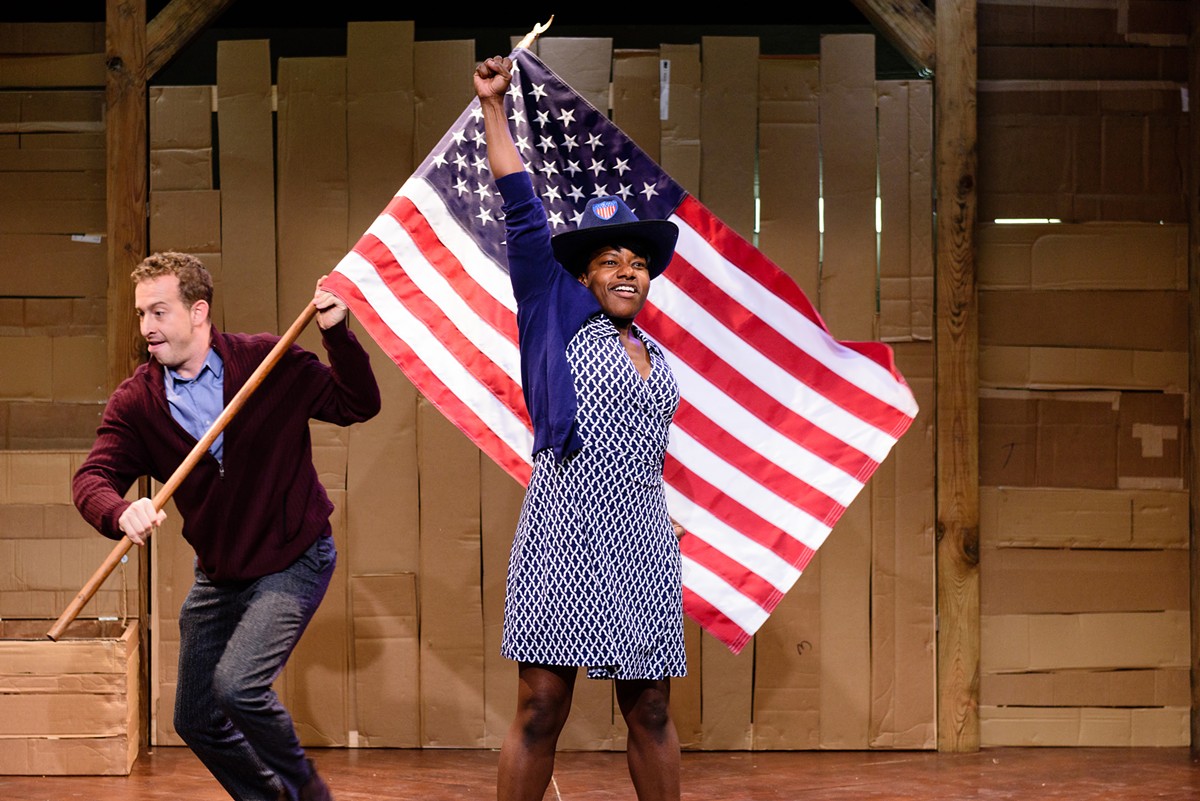Terrorism, transgender identity, slavery, BDSM, addiction, and depression — these are just some of the themes slated for exploration in No Safety Net, a new performance art series from the University of Michigan's University Musical Society.
"We purposefully selected plays that put major societal topics on the table, so issues that inspire strong beliefs, but that can be rather difficult to talk about," says UMS spokeswoman Mallory Shea. "We curated the festival with the specific intention of examining the way that theater can be used. It's exploring theater as a tool for disrupting, organizing, and creating counternarratives to the status quo."
She adds, "The leadership here has stated that universities should be dangerous places for ideas, and safe spaces for people."
No Safety Net's programming offers a three-week series of 22 performances. "Audience members are going to be asked to reconsider their own opinions and biases, and definitely to listen to different viewpoints," Shea says. "We want to get various different voices in the room, and try and create a platform for that kind of dialogue in the community."
To do that, No Safety Net will also include educational workshops on topics such as systemic racism and gender identity. Shea says she hopes that people will all participate in these activities in addition to enjoying the performances.
Two of the productions will be U.S. premieres — and also the only time those two productions will be presented in the U.S. this season. Those include Us/Them by Belgian Theatre company Bronks (which offers a look at a 2004 Beslan hostage crisis through physical theater, with an intended audience of children ages 12 and up) as well as (I Could Go On Singing) Over the Rainbow (an immersive work by Glasgow-based artist FK Alexander that focuses on addiction and recovery, featuring music from the noise band Okishima Island Tourist Association).
Emblematic of the festival's aspirations is Underground Railroad Game, a play written by Jennifer Kidwell and Scott Sheppard of Philadelphia's Lightning Rod Special troupe, who also serve as the production's sole performers.
The production is based on Sheppard's childhood growing up in Hanover, Penn. Located outside of Gettysburg, Sheppard says the town has a big Civil War reenactment culture, which manifested in one of his school's most popular traditions, the Underground Railroad Game — essentially a live action role-playing game in which the students were divided up into Union and Confederate soldiers and tasked with sneaking "slave" dolls from one side of the school to the other.
"I'll be completely honest, and I'll say the fucked up part of it didn't really dawn on me until later," Sheppard says with a laugh. "We didn't quite appreciate at all how awful things were — the politics of the war, the things that were being fought for, the ignorance behind it, and the capitalism built on the slave system."
Sheppard says looking back, his school's Underground Railroad Game seemed to more so romanticize the war rather than cause the students to think about it critically. "It was this metaphor where it was almost ham-handed, in the sense that slaves were still literal objects," he says. "There were no African-American students except for this one student, and he was assigned to be a Confederate soldier."
It wasn't until much later — when Sheppard and Kidwell, who grew up across the Mason-Dixon line in Baltimore, both found themselves attending the Pig Iron School for Advanced Performance Training in Philadelphia in 2011, as part of its inaugural class — that Sheppard started really thinking about his childhood Civil War LARPing experiences.
Unexpectedly, he says he and Kidwell, who had never worked together, were assigned to make a piece together. That was the origin of what would later become Underground Railroad Game the play.
But that's just a starting off point for the production. At times, the production parodies American racial tropes — the black slave, the white savior. "It oscillates between a few different realities," Kidwell explains. "There's this historical fiction, this romanticization of the past, which is also like a reduction of the past, or a simplification. I think the piece indulges in that, but it's also critiquing through that indulgence." At other times, Sheppard and Kidwell play teachers inspired by Sheppard's childhood experiences playing the Underground Railroad Game, where they address the audience as if they are students at the school. And the "roleplaying" here is not just limited to the children — the play further explores its themes through a BDSM-heavy romance subplot in which the racial tropes it explores are turned upside down.
"Eventually, it became a piece about how we teach history and how we learn about history," Sheppard says. "And so this piece that I thought was going to be about the past became about the present."
No Safety Net starts Jan. 17; Arthur Miller Theatre, 1226 Murfin Ave., Ann Arbor and the Stamps Gallery, 201 S. Division Street, Ann Arbor; see ums.org/nosafetynet for more information; Shows run through Feb. 3.


